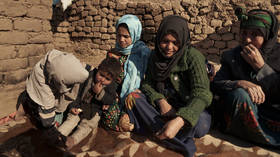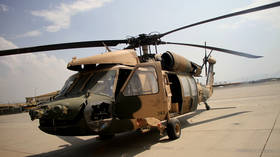US hypocrisy could kill millions in Afghanistan’s famine

Afghanistan is facing a severe famine, the worst in decades, which could potentially lead to the death of millions of people. A drought, combined with a drastic cut in aid, has left many Afghans on the edge of starvation.
Reports suggest that 24.4 million people – more than half of the 37.3 million inhabitants of the country – are facing extreme hunger, and 98% are not getting enough to eat.
According to the charity Save the Children, 3.9 million Afghan children are facing severe malnutrition and 13 million are in desperate need of aid. Things have gotten so desperate that young girls – who will eventually end up as child brides – are being sold by desperate families so that they can purchase food.
It is obvious to all that Afghanistan is on the precipice of a humanitarian catastrophe. Prior to the calamitous withdrawal of the United States in August last year, 80% of the Afghan government’s budget came from international aid. Since the return of the Taliban, however, this funding has largely been withdrawn, leaving the country on the brink of famine.
There have, however, been commitments to provide assistance to Afghanistan, and the United Nations Security Council recently passed a resolution which exempts humanitarian aid from the sanctions imposed on the Taliban regime.
The European Union has promised to give $1 billion, and the US has also pledged an extra $308 million, on top of the $782 million in humanitarian aid it has already provided. But this is nothing like the amount Afghanistan was receiving prior to the American withdrawal.
There are also problems getting the aid to the people who need it most. Presently it is being delivered by road, as most flights into Kabul have been suspended.
The reason for this is that the US is determined to stop the Taliban siphoning off the bounty, so aid is not being delivered through official channels. Moreover, the US is using the aid as leverage to force the Taliban to recognise women’s rights, both in education and employment.
Although this stance is undoubtedly contributing to the oncoming famine, it has the support of US voters, so do not expect a change in policy anytime soon. A recent poll showed that “60 per cent of American voters, including 47 per cent of Democrats and 3 in 4 Republicans, oppose sending financial aid to mitigate Afghanistan’s multiple humanitarian crises because the money could end up with the Taliban.” However, just because the majority support a policy does not mean it is morally right.
It must not be forgotten that the US occupied Afghanistan for 20 years. So, surely it must hold some responsibility for what is happening now? Questions must be asked about where the $2 trillion Joe Biden claimed was spent in Afghanistan actually went. Also, let’s not forget that the Taliban are only back in power because of Biden’s calamitous scuttle from Kabul last August.
At the time, the US Secretary of State, Antony Blinken, tweeted that “the United States will continue to support humanitarian aid to the Afghan people. It will not flow through the government, but rather through independent organizations, like @UN agencies & NGOs. We expect that those efforts will not be impeded by the Taliban or anyone.”
However, since the farcical withdrawal, and the awful scenes of desperate people falling from aeroplanes at Kabul airport, Afghanistan has had its $9 billion cash reserves frozen by the World Bank. The logic is that if the reserves were to be freed, it would fall into the hands of the Taliban.
Nevertheless, whatever you think of the Taliban – and I happen to believe they are barbaric – they cannot be expected to sort out the problems of Afghanistan after only six months in power, especially when their hands have been financially tied.
There have been calls from prominent politicians for more aid to be released. For example, former British Prime Minister Gordon Brown said “Britain should call a pledging conference to raise 4.5 billion to help the 22 million of Afghanistan people who are in danger of starvation.”
I have been a long-term critic of the UK’s foreign aid budget, and I applauded its reduction last year. However, I believe alleviating the problems of the Afghan people, and preventing mass starvation, would be a justified use of that budget.
The West, and particularly the US, now faces a stark choice: it can either negotiate with the Taliban and free up the cash to save thousands, if not millions of lives; or it can keep the cheque book closed and Afghanistan’s assets frozen, which will undoubtedly lead to the death of countless innocent people.
I know what choice I would make, although having to deal with the Taliban would be done through gritted teeth. The simple fact, however, is that the West cannot allow people to starve to death off the back of running away from Afghanistan.
The statements, views and opinions expressed in this column are solely those of the author and do not necessarily represent those of RT.
















